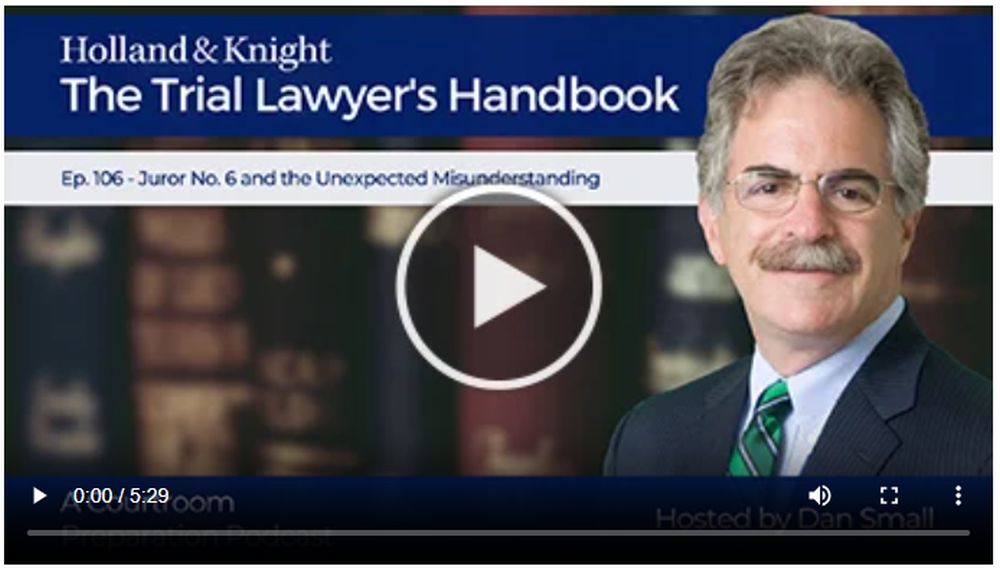- within Strategy topic(s)
In this episode of "The Trial Lawyer's Handbook" podcast series, litigation attorney Dan Small reflects on the unpredictable and often mysterious nature of jury selection and engagement, sharing the story of Juror No. 6 from the challenging Cammarata Racketeering Influenced and Corrupt Organizations Act (RICO) trial. Despite appearing disengaged and distant throughout the trial, Juror No. 6 proved a key contributor in deliberations, demonstrating the importance of patience and understanding in the courtroom. Mr. Small emphasizes that trial lawyers must craft their narratives with Juror No. 6 in mind: assuming that jurors are listening and striving to make complex stories accessible and meaningful to every member of the jury, even those who may seem withdrawn. This episode offers a powerful reminder of the human element in trials and the responsibility lawyers have to connect with juries to achieve justice.
Listen to more episodes of The Trial Lawyer's Handbook here.
Mr. Small is also the author of the American Bar Association (ABA) book Lessons Learned from a Life on Trial: Landmark Cases from a Veteran Litigator and What They Can Teach Trial Lawyers.
Podcast Transcript
Dan Small: Picking a jury, no matter how extensive your experience, no matter how many experts you bring in as consultants and all the rest, remains at least in part a black box. Sometimes you just have to have faith. It's popular to bash juries. Do they make mistakes? Of course they do. They're human. But I do, after all these years, have a basic faith in their collective wisdom and how hard they usually try to get it right. I learned this lesson in the Cammarata drugs and murder RICO trial we've been talking about in the past several episodes. I learned it from Juror No. 6, and I will always be grateful to him.
Juror No. 6 was a Hispanic fellow, high school education, regular job, no apparent reason to exclude him from the jury. So there he was. Sitting in the front row. But from the first day he just sat there, staring up into space. I could not get him to look at me or look at the witness. I was frustrated and angry. Here I was, trying a very difficult, month-long criminal trial, and I need, as a prosecutor, a unanimous jury for a conviction. If Juror No. 6 has checked out, the whole trial becomes a roll of the dice. Which way did he decide, if at all, before he checked out? Who knows?
I tried every trick I could think of to get his attention: dropping my pen right in front of him and bending down so I could get close, trying to use him to hand any document or photo that was being passed to the jury, but nothing worked. The rest of the jury was angry with him, too. In such an intense trial, the jury became very close. They actually had reunions every year afterwards for some time, apparently. I was invited, but I didn't attend. But during breaks during the trial, Juror No. 6 would sit silently in the corner of the jury room. We talked about asking the judge to kick him off the jury, but there didn't seem to be enough of a basis. He wasn't sleeping, he just appeared to be focused elsewhere. And so he stayed through that long, hard month.
At the close of the evidence, when the jury went back to start deliberations, we were all in for a surprise. The first time a juror couldn't remember a piece of evidence, BANG! Juror No. 6 provided it. And the next fact, and the next one. Couldn't remember the judge's instruction on a particular point? BANG! Juror No. 6 had it. And so on. He very quickly went from a concern to a hero. From being the bad guy to being the good guy. Why? Why did it happen that way? You know, it turns that out to him, this was the most important thing he had ever done. But no one had ever asked him to sit in a chair and listen for eight hours a day. Think about that. No one's ever asked you that either, have they? How was he supposed to fulfill this important duty? The best solution he could come up with was to tune out everything else, ignore all distractions and just listen. If that meant staring off into space, so be it. That's what he did, and for him, it worked.
I think about Juror No. 6 often. I talk about him when I'm teaching lawyers how to try cases or teaching witnesses how to communicate. As trial lawyers, we are storytellers, teachers and advocates. But we have to do all those things without real feedback from the real audience. So we have to assume that they are listening and want to understand, and we have to take the responsibility of telling our story, teaching our lesson and advocating our case in ways that are accessible and meaningful to Juror No. 6. He's trying hard to listen. Give him a chance, give him a reason, give him something worth listening to. Therein lies the real challenge of trying cases. Good luck in court.
The content of this article is intended to provide a general guide to the subject matter. Specialist advice should be sought about your specific circumstances.


